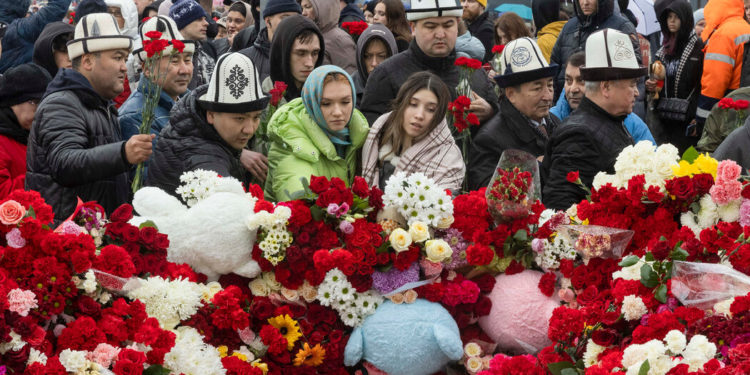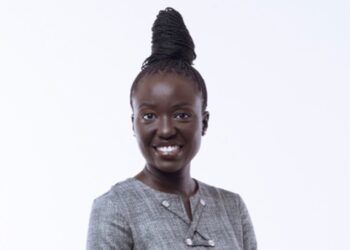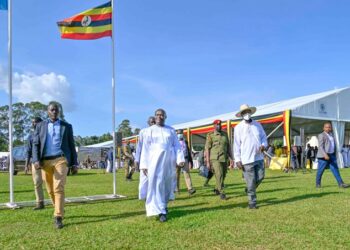By THE NEW YORK TIMES
What the terrorist attack means for Russia
Investigators brought charges yesterday against four men who they said killed at least 137 people at a concert hall near Moscow on Friday.
The four suspects, who face a possible life sentence for the worst terrorist attack in Russia in 20 years, were identified as Dalerjon Mirzoyev, Saidakrami Rachabalizoda, Shamsidin Fariduni and Muhammadsobir Fayzov.
The Islamic State claimed responsibility for the attack, and U.S. officials said it appeared to be the work of ISIS-K, the branch of the terrorist group that is active in Pakistan, Afghanistan and Iran. Mounting evidence supports that claim.
But Russian commentators and state media are mostly ignoring ISIS and accusing Ukraine of being linked to the attack. Russia’s president, Vladimir Putin, has also hinted at that notion, which Kyiv has strongly denied.
I spoke with my colleague Valerie Hopkins, who covers Russia, about the reaction to the attack and what it means for Russia’s security.
Q: How has Putin responded to the attack so far, and how has he tried to tie it to Ukraine?
Valerie: It took 19 hours for him to address the nation, and when he did, he said that suspects had been apprehended and that they had been driving toward Ukraine, where he said the Ukrainians had prepared a window for them to enter the country. He did not mention ISIS.
He said in no uncertain terms that the terrorists would be punished, and that no one who was part of perpetrating the attack would be spared. He tried to respond in a very strong manner, but without really laying out what the motive was or saying whether investigators had uncovered other people.
Q: How are people reacting in Russia?
Valerie: There’s still a lot of shock, there are still a lot of questions and there’s still so much that’s not very clear to most people. You can see these pictures in Moscow of heaps of flowers and memorials that look not dissimilar to the way people reacted when Aleksei Navalny or Yevgeny Prigozhin were killed.
Q: Do Russians seem to believe that Ukraine was responsible?
Valerie: In the interviews that we’ve done, no one has talked about that theory. I’m sure that there are people who believe it. And there’s a host of pro-government analysts who are slowly trying to develop the narrative that these guys were recruited in Tajikistan by the Ukrainian embassy.
It is too soon for polling, which is already very difficult in Russia. But in the absence of data, I would say that the reaction largely depends on your political views. I think that there are a lot of people who are very scared about what this attack portends for Russia, which is already a very security-oriented country. Every time you go into a shopping mall or most public places, you are supposed to go through metal detectors.
From what I am told by people in Moscow, all of the shopping malls and other public places have been relatively empty since the shooting.
And I think another group of people have blamed the security services for focusing a) so much on Ukraine and b) frankly, on political opposition and minority groups, many of whom have the same legal status as ISIS-K. Aleksei Navalny was considered a terrorist and extremist under Russian law. And anyone who’s part of the L.G.B.T. community is considered an extremist.
So those who are more opposition-minded have taken pains to point out that perhaps if the security services hadn’t been focused on raiding gay clubs and cracking down on antiwar groups and human rights activists, they would have done better at preventing this attack.
Q: Do you have any sense of how the attack has affected people’s view of Putin and the government?
Valerie: I think that many of Putin’s supporters want him to have a strong hand. And Russia, I believe since the war started, is spending about 30 percent of its budget on the military, the security services and the correctional institutions — it’s a huge percentage of the state’s expenditure. And it’s a gigantic apparatus, and I think that there are people who have questions about how it was that it failed. (My colleague Anton Troianovski wrote about what the attack means for Russia’s security apparatus.)
While independent pollsters say that most Russians do actually still believe that they are living in a democracy, many of them accept that they may not have the same rights that people in the West have, but that’s in exchange for a relative sense of security.
Putin came to power on New Year’s Eve in 1999, and he promised to get everything in order, to stop inflation and to get the economy on the right track. The economic chaos of the 1990s eventually subsided, and many Russians still credit him for that. The war and the general mobilization in September 2022 were a huge break in that social contract of “Don’t get involved in politics, and we’ll provide you with a secure and reasonably operating state.” This attack is a reminder that even accepting that compromise does not necessarily keep you safe.
The brutality behind sugar
Coke and Pepsi have helped turn the Indian state of Maharashtra into a sugar-producing powerhouse.
But a New York Times and Fuller Project investigation has found that these brands have also profited from a brutal system of labor that exploits children and leads to the unnecessary sterilization of working-age women.
About 200 waiters jogged through the streets of Paris, each of them carefully balancing a tray with a croissant, a glass of water and a small coffee cup.
Paris officials revived the race before the Olympics this summer to illustrate that sipping coffee at a cafe is as integral to the city’s cultural heritage as its most famous landmarks are.
Lives lived: The Italian pianist Maurizio Pollini was a modernist master of the instrument. He died at 82.
Crafting a new tongue for ‘Dune’
Frank Herbert’s novel “Dune” contained dozens of words of Chakobsa, a language spoken by the sandworm-riding Fremen people.
But that limited vocabulary was not enough for the dialogue in Denis Villeneuve’s film series. So professional language constructors, or “conlangers,” had to create a realistic language, much as they did for the show “Game of Thrones” and the “Avatar” films.
RECOMMENDATIONS
Cook: This cauliflower shawarma replaces meat with cauliflower florets and onion wedges that have been tossed with spices and roasted.







Discussion about this post